SPECIAL REPORT: ‘In the Shadow of Flames’ Rivers Communities Grapple with Devastation from Methane Emissions

By Dare Akogun
In the small, oil-rich community of Egbema, located in Ogba Egbema Ndoni Local Government Area (ONELGA) of Rivers State, the air is thick with an oppressive heat that clings to the residents like a shadow.
Deborah Ibifiri, a 24-year-old single mother of two, rises each day to face this grueling reality, a stark reminder of the man-made crisis plaguing her home.
The relentless heat is not a natural phenomenon but a consequence of industrial fires from gas flaring. This practice has turned the skies above Egbema and surrounding communities into a perpetual haze of harmful gases.
Deborah’s modest house, just a stone’s throw from the crude oil flow station in neighbouring Ebocha recently taken over by Oando from Italian oil giant Eni through its local subsidiary Nigerian Agip Oil Company, stands as a silent witness to the daily torment.
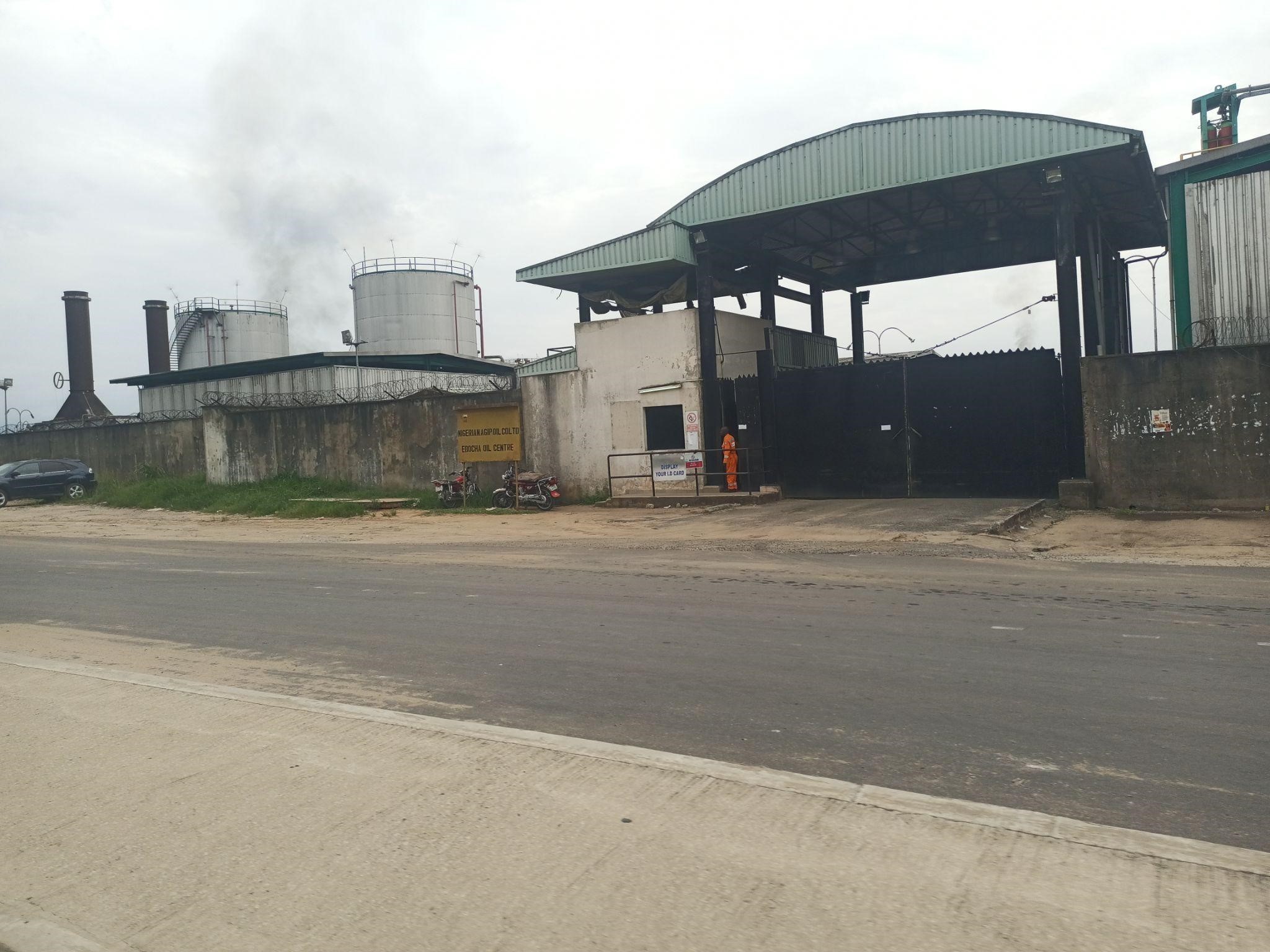
Sitting on a wooden seat in front of her home, she points to her neighbour’s stunted cassava farm, a grim testament to the devastation wrought by the flares. “A lot of things don’t survive here anymore,” she says, her voice heavy with sorrow.
Once a thriving cassava farmer, Deborah has been forced to abandon her fields and now operates a POS machine to make ends meet.
“Our common cassava, because of the flaring, doesn’t yield as bountifully as it used to in the past, and the waters are condemned,” she laments.
The environmental damage has rendered the soil infertile and the water sources contaminated, stripping the land of its ability to provide for its people.
“I have always been aware of this heat, ever since I was a child. As much as gas is helpful, the flaring has caused more harm than good in this area,” she reflects, highlighting the cruel irony of their situation.
Deborah is just one of thousands living close to gas flaring sites in the Niger Delta.
The very resource that should have brought prosperity has instead brought suffering and despair to Deborah and her community.

‘Non-stop Gas Flaring’
Despite Nigeria’s commitments to end gas flaring, the practice remains rampant, especially in oil-producing communities like Egbema.
The country has repeatedly missed its self-imposed deadlines to cease gas flaring, with the most recent 2020 deadline postponed indefinitely.
According to data from the National Oil Spill Detection and Response Agency (NOSDRA), Nigeria flared approximately 224.9 billion cubic feet of gas in 2022 alone, contributing significantly to environmental pollution and climate change.
The agency in the report disclosed that this translated to a loss of $787.2 million, an equivalent of N362.931 billion, in the 12 months of 2022, compared with $911.0 million (N420.007 billion) recorded in 2021.
The Environmental Protection Agency further stated that the offending oil firms were also expected to pay penalties of $449.8 million, about N207.376 billion, to the Federal Government in 2022, compared with penalties of $520.6 million (N240.017 billion) in 2021.
Gas flaring releases numerous harmful substances, including carbon dioxide (CO₂), methane (CH₄), and volatile organic compounds (VOCs), which contribute to global warming and pose severe health risks.
Scientific studies have established that these emissions can lead to respiratory problems, cancer, and other chronic diseases. Flaring also produces acid rain, damaging crops and contaminating water sources.
Victoria Ikoro, a middle-aged farmer who spoke to our reporter inside the Egbema market, highlighted the economic toll: “A few years ago, a sack of cassava sold for between ₦10,000 to ₦15,000, but now it’s between ₦40,000 to ₦55,000 due to scarcity.”
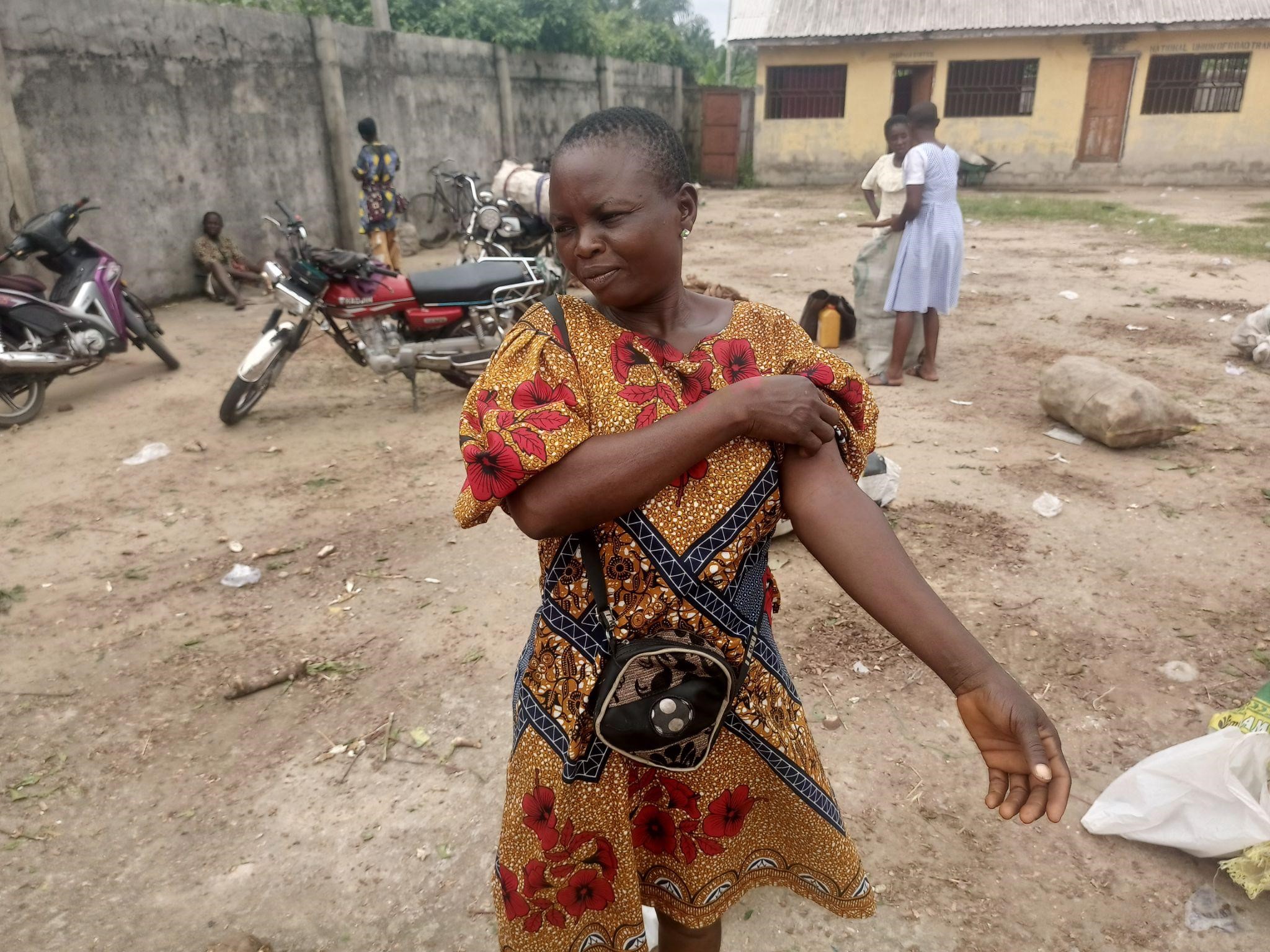
This significant price increase is a direct result of reduced crop yields, forcing many families into deeper poverty.
“People don’t buy again, we mostly sell quarter sacks, the economy is bad now, my son at the Federal College of Education in Omoku has stopped going to school because I can’t afford the fees,” she said.
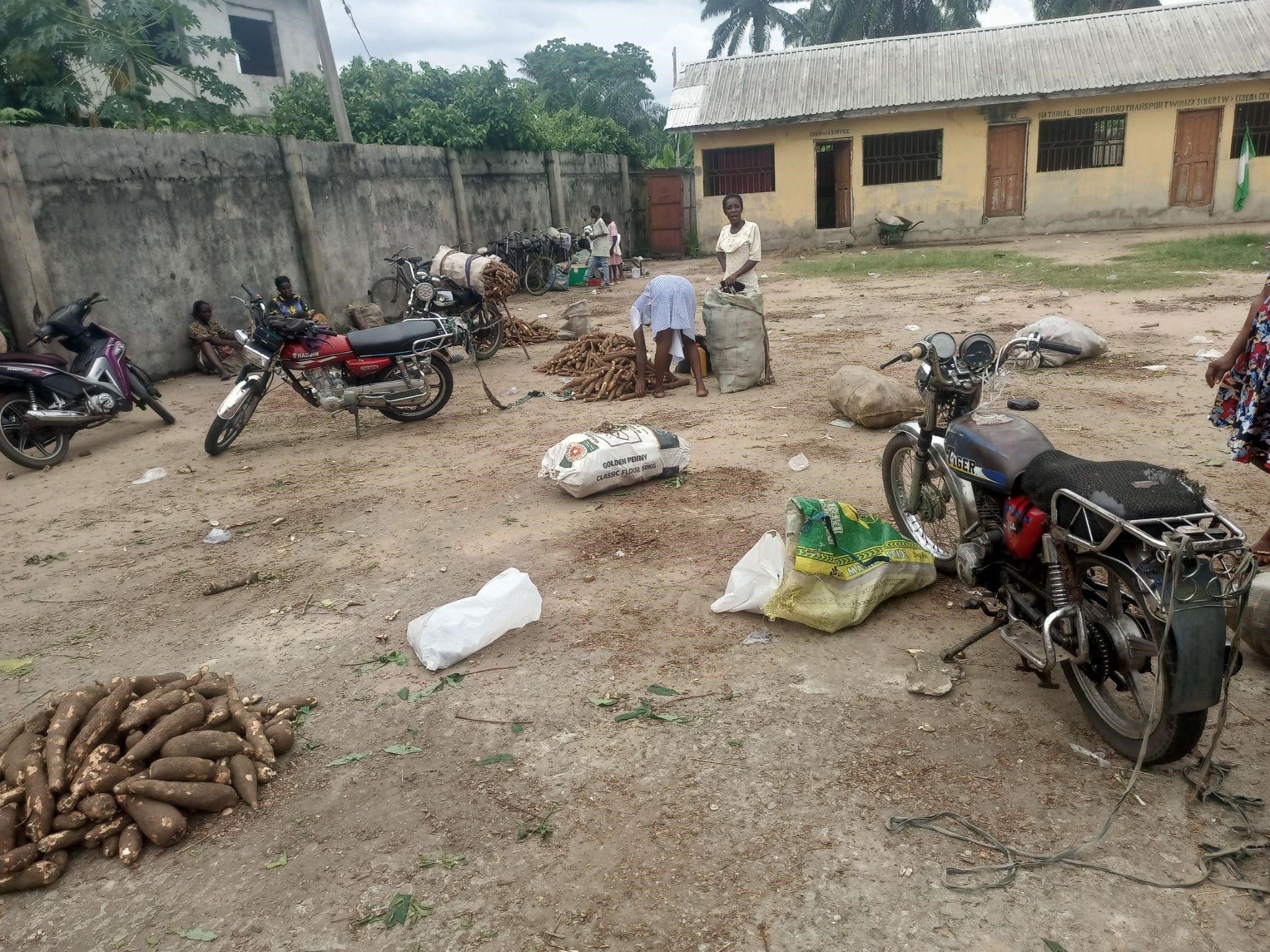
In recent years, the cost of garri, a starchy flour made from cassava root and a staple in Nigeria, has soared in the region. Many women like Ikoro plant cassava, but they say their yields have been decreasing, although, they add, it’s hard to tell by how much.
Ekwem Douglas, a community youth leader in Egbema, emphasised the decline in farming: “In times past, one hectare of a cassava farm can produce between 200–300 sacks, but now hardly will you see a hundred sacks during harvest. Apart from the effects, our women don’t have modern farming implements, so the little they plant doesn’t come out good.”
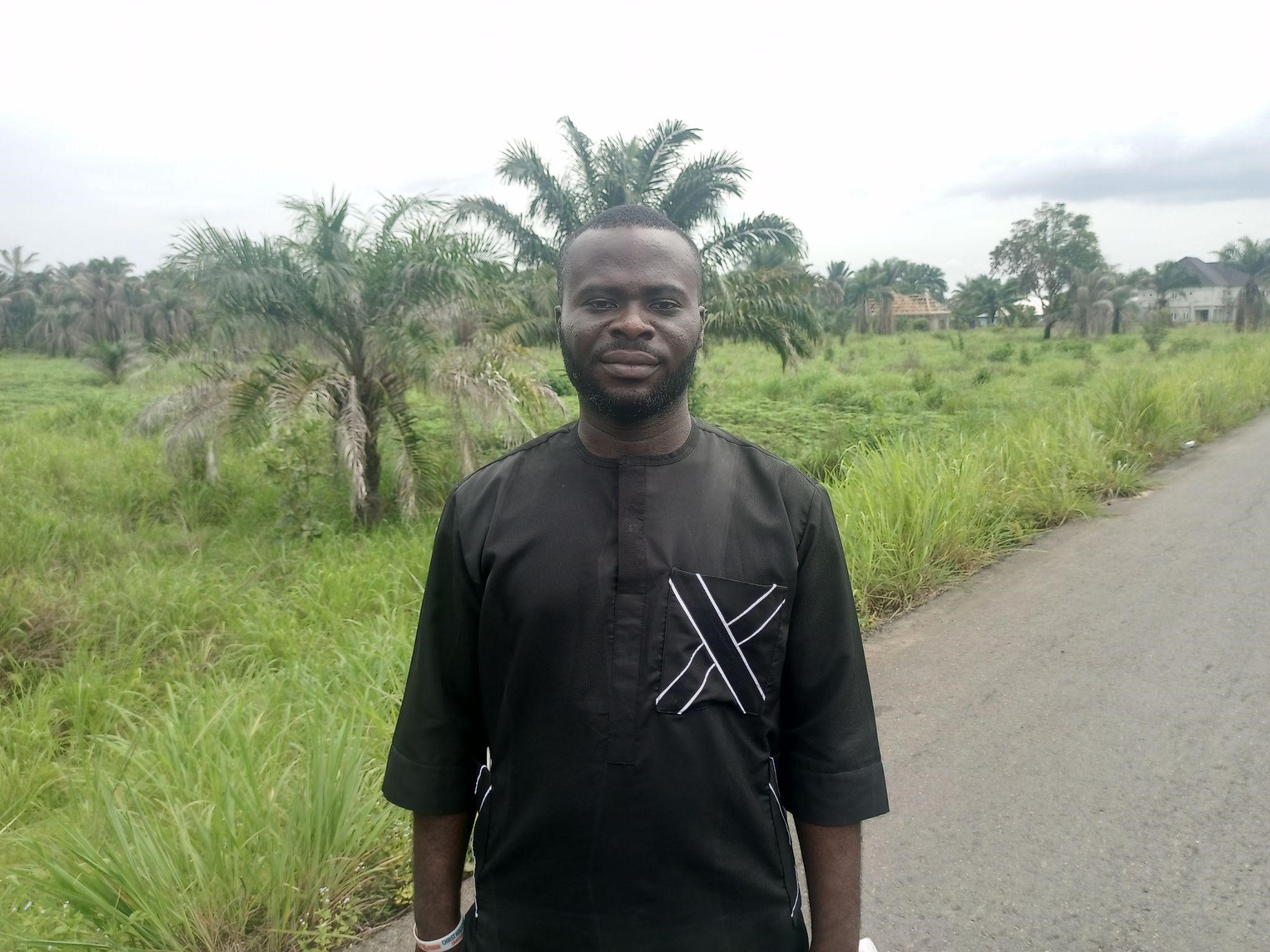
“We want the government to come to our assistance. I don’t have any other job, farming and fishing have been what I depend on to make ends meet,” he said.
Rivers State is one of the richest states in Nigeria. But according to data from the Nigeria Bureau of Statistics, women in rural communities like Ebocha, Egema, Ndoni, Egi, and others who depend on subsistence farming, are much poorer than those living in urban areas.
Nsue Brown, who hails from Obrikom, another affected community, pointed out the drastic changes: “In the past, garri and fish were plentiful, but now most garri sellers don’t have any cassava from which to make it because the little ones available are too costly, and there is no single fish inside the Nkisa River in the community.”
Our reporter, while surveying the town of Egbema, observed a stark transformation in the Nkisa River, which flows beneath the bridge at one end of the town.
Once a vital source of clean water and abundant fish for the women in the community, the river now glistens with an eerie, filmy, rainbow-coloured surface. This disturbing change is a clear sign of severe contamination.
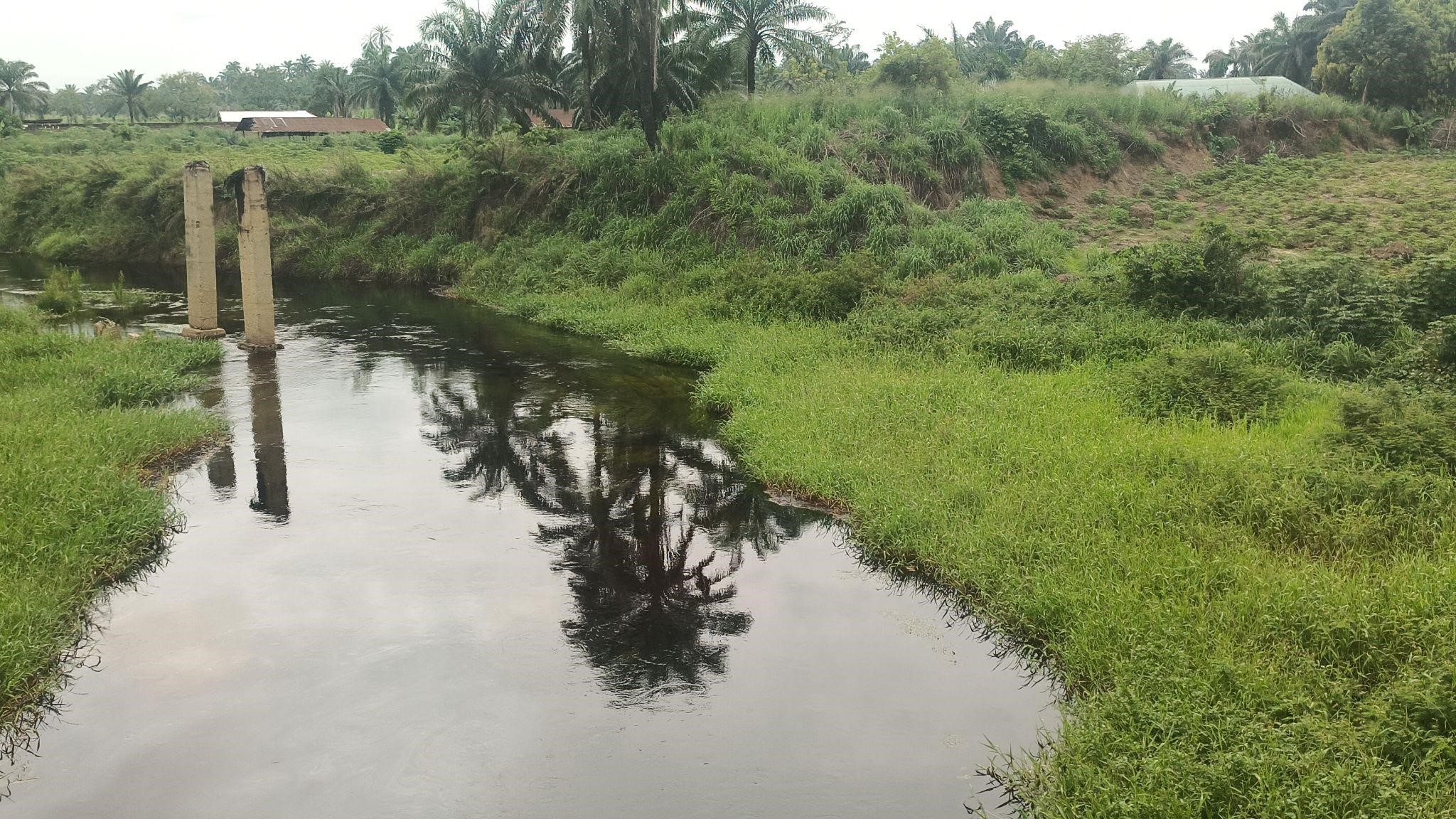
The once-thriving river, which used to be a lifeline for the community, now serves as a grim reminder of the detrimental effects of industrial activities on local water bodies.
The women, who once relied on the Nkisa River for their daily needs, now face an uncertain future, their livelihoods and health jeopardised by the relentless pollution.
‘ONELGA Council Boss Reacts’
The Executive Chairman of Ogba Egbema Ndoni Local Government Area (ONELGA), Hon. Vincent Job, JP, called on the Federal Government and oil field operators to urgently address the destructive activities of oil companies in the council, which have severely impacted farmlands and livelihoods.

Speaking through his Chief Press Secretary, Ndu Ajie, Hon. Job emphasised the council’s commitment to supporting local farmers, especially women smallholder farmers, by providing them with enhanced agricultural resources.
“The lives of our people are in danger, and their livelihoods have been ruined due to the polluted air. The prolonged oil spill into the atmosphere has both immediate and long-term effects on the health of our inhabitants,” he stated.
“In response to the adverse effects of methane emissions from gas flaring on crop yields, the council has taken proactive steps by distributing improved yam seedlings, enhanced cassava stems, fertilizers, and various agrochemicals to bolster local farming practices.
“By empowering women smallholder farmers with improved agricultural inputs, we are not only boosting local production but also enhancing their economic well-being,” Hon. Job added.
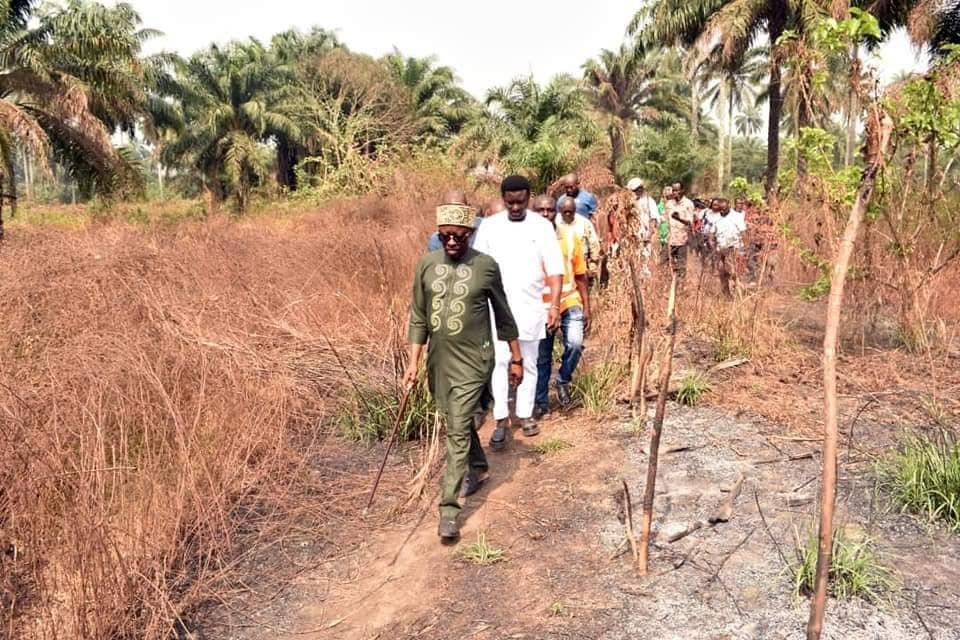
‘Alarming Economy Impact’
The economic impact of gas flaring is profound. As farming yields decrease, food prices soar, leading to increased food insecurity.
Unemployment rates are particularly high among women in these rural areas, exacerbating the financial strain on families.
The degraded land has forced some farmers to seek more fertile soil in distant, non-flaring communities, leaving Ebocha with fewer food producers and higher living costs.
Environmental and Health Impacts
Nnimmo Bassey, Director of the Health of Mother Earth Foundation (HOMEF), highlights the severe consequences of gas flaring on agriculture in the Niger Delta region.
According to Bassey, gas flaring is not only a violation of the right to life but also the largest single source of greenhouse gases in Nigeria. “We cannot afford to allow this huge contributor to global warming and the resulting sea level rise that is rapidly washing away our coastlines,” he stated.
Bassey emphasised that methane emissions from gas flaring in the Ogba/Egbema/Ndoni area have drastically reduced crop yields, severely impacting the economic stability of local farmers. Women, who form a significant portion of the agricultural workforce, have been particularly hard hit.
“The heat from gas flaring, coupled with acid rain, negatively affects the soil, and crops like cassava can’t easily recover,” he said.
George Emmanuel, a Programme officer with Protect Women Initiatives a NGO advocating for rural women’s rights in the Niger Delta, said flaring from oil production facilities is like setting a match to an enormous container of lighter fluid.
“Flaring emits a cocktail of toxic substances; they are so hot that nothing will grow next to them. Emissions resulting from flaring in this open, uncontrolled manner will be a mix of smoke, more precisely referred to as particulate matter; combustion by-products, including sulfur dioxide, nitrogen dioxides, and carcinogenic substances, such as benzpyrene and dioxin; and unburned fuel components, including benzene, toluene, xylene, and hydrogen sulfide.
According to a report by the United States Environmental Protection Agency (U.S. EPA): “Many scientific studies have linked breathing particulate matter to a series of significant health problems, including aggravated asthma, increases in respiratory symptoms like coughing and difficult or painful breathing, chronic bronchitis, decreased lung function, and premature death.
“It has been established that exposure to benzene and its metabolites causes acute no lymphocytic leukemia and a variety of other blood-related disorders in humans”
Impact of Gas Flaring on Health and Environment
Nigeria is part of the World Bank’s Global Gas Flaring Reduction Partnership (GGFR), a campaign to end flaring by 2030, which the institution says will help mitigate global warming effects.
Gas flaring, a common practice in Nigeria’s oil-rich regions, poses serious health and environmental risks to nearby communities. The gases released during flaring contain harmful pollutants like oxides of Nitrogen, Carbon, and Sulphur, which can acidify the soil and reduce the nutritional value of crops. This can lead to health issues such as respiratory disorders, cancer, neurological problems, and skin irritations.
Studies have shown that residents of communities near gas-flaring sites are more likely to experience medical conditions like skin diseases, respiratory symptoms, and fever. Children, especially those under five years old, are particularly vulnerable, experiencing coughs, respiratory issues, and short-term nutritional problems.
While Nigeria has made progress in reducing gas flaring nationwide, the practice persists in the Niger Delta, where companies prefer to pay fines rather than address the issue. Gas flaring releases greenhouse gases and other pollutants into the atmosphere, contributing to climate change and posing a significant health hazard to nearby populations.
In states like Rivers, Bayelsa, and Delta, around 12 million tons of methane are released annually due to gas flaring. Approximately 2 million people live within four kilometres of a gas flare in the Niger Delta, exposing them to its harmful effects. The government and oil companies need to take urgent action to reduce gas flaring and protect the health and well-being of affected communities.
In 2004, through a public-private agreement, the Nigerian Liquified Natural Gas project (NLNG), which turns gas into liquids for sale to Middle Eastern and European markets, was launched. The volume of gas flared in ratio to gas produced fell to 10% in 2018, down from 53% in 2002, partly due to the activities of the NLNG and other gas utilisation efforts.
But despite relative progress, gas flare rates have been ticking back up in recent years, according to data from Nigeria’s National Oil Spill Detection and Response Agency, NOSDRA.
Government and Corporate Accountability
Despite the visible devastation, the response from the government and oil companies has been inadequate. Local activists and civil society organizations (CSOs) have called for stricter enforcement of flaring regulations and better support for affected communities.
Oil companies operating in the Niger Delta have faced criticism for their role in perpetuating gas flaring. While some technological advancements allow for the safe capture and transportation of excess gas, the implementation of these solutions remains limited due to cost considerations.
Nelson Asamabrowei, a project manager at a Port Harcourt-based CSO supporting women in the Niger Delta, seeks for immediate intervention to address the devastating effects of gas flaring in the region.
He emphasised the urgent need for the government and oil companies to take responsibility for the environmental damage caused by their activities.
“The government and oil companies must take responsibility for the environmental damage and provide adequate compensation and support to the affected families,” Asamabrowei stated.
The continuous flaring of gas in the Niger Delta has led to significant methane emissions, which have severely impacted crop yields.
According to him “Farmers in ONELGA, especially women who form a substantial portion of the agricultural workforce, are facing economic instability due to reduced harvests.
“The contamination of soil and water sources by harmful pollutants has further exacerbated the situation, making it difficult for these communities to sustain their livelihoods,” he said.
This story is supported by the Centre for Journalism Innovation & Development
